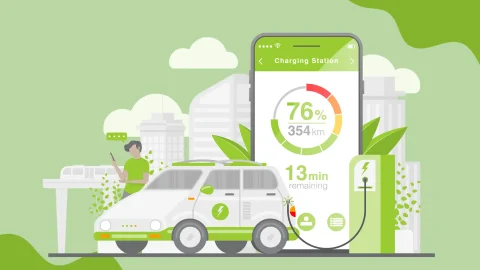The Maharashtra Cabinet, led by Chief Minister Devendra Fadnavis, has approved the state’s ambitious Electric Vehicle (EV) Policy 2025. This policy aims to fast-track electric mobility, support EV manufacturing, and reduce air pollution. It will remain in effect until 2030.
To support this plan, the government has allocated INR 1,993 crore over the next five years. The funds will help implement various measures, including toll waivers, purchase subsidies, and a statewide charging network.
Toll Waivers for EVs on Highways
The new policy introduces toll waivers for electric vehicles traveling on highways. This benefit will make long-distance travel more cost-effective for EV owners. It also encourages more people to consider switching to electric transport, especially for intercity routes.
Financial Incentives Across Vehicle Categories
To boost adoption, the government will offer a 10% subsidy on the original cost of EVs. This applies to several vehicle categories:
-
Electric two-wheelers
-
Electric three-wheelers
-
Private electric cars
-
State transport buses
-
Private buses and civic transport fleets
By covering both private and public segments, the policy ensures broader support for the transition to cleaner transport.
Charging Stations Every 25 Kilometers
To make EV use practical, the policy prioritizes the installation of charging stations. These stations will appear every 25 kilometers along national highways. With this move, the government addresses the common concern of range anxiety and supports seamless intercity travel.
In urban areas, additional charging infrastructure will be set up in residential and commercial zones. The goal is to make charging convenient and accessible for everyone.
Targeting Air Pollution Through Clean Mobility
Air pollution remains a serious issue in major cities like Mumbai, Pune, and Nagpur. Vehicle emissions contribute heavily to declining air quality. By promoting electric transport, the government hopes to reduce pollution levels and create healthier cities.
The policy does more than just encourage purchases. It also pushes for a cleaner lifestyle and better air for future generations.
A Transition Plan Till 2030
The new EV policy outlines a long-term mobility transition model. It offers incentives for people and businesses that switch to electric vehicles before 2030. This approach promotes steady growth rather than sudden change, ensuring that adoption is both sustainable and practical.
Government departments and municipal bodies will also be encouraged to replace existing fleets with electric alternatives.
Supporting Local Manufacturing and Innovation
Besides consumer-focused benefits, the policy supports EV manufacturing within the state. It invites startups and manufacturers to set up production units, especially for components like batteries and motors.
The state wants to become a leading hub for electric vehicle innovation. With the right infrastructure and policy support, Maharashtra hopes to attract both domestic and international investment.
Delhi Also Moves Ahead with EV Incentives
Maharashtra’s announcement comes at a time when Delhi is preparing to launch its EV Policy 2.0. Reports suggest Delhi might offer subsidies of up to INR 30,000 for two-wheeler EVs. This shows a growing trend among Indian states to compete in clean mobility leadership. Consumers across India will likely benefit as these incentives become more generous and widespread.
A Clean Transport Future Is Within Reach
Maharashtra’s EV Policy 2025 signals a major step toward a cleaner and more efficient transport system. Whether you are a commuter, fleet operator, or business owner, the policy offers reasons to make the switch.
With toll waivers, purchase discounts, and better-charging infrastructure, owning an electric vehicle is now more practical than ever. The government has taken the lead. The question is—will you follow?
For more such latest updates follow FounderLabs.
